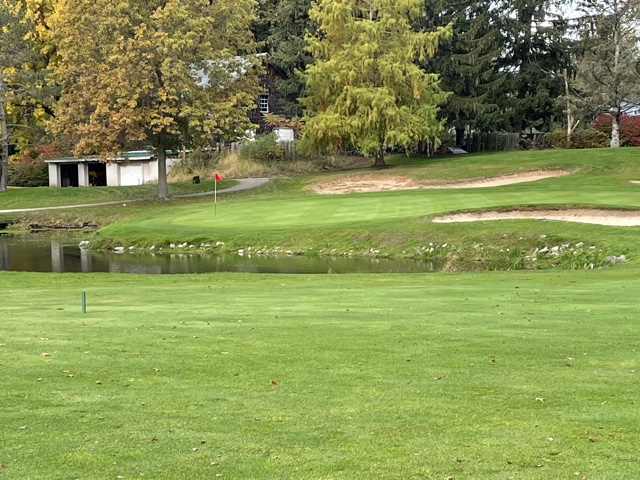5 strategies for high handicappers:
- Keep the ball in play
- Know how far you hit each club
- Play for bogey
- Get 100% of chip shots on the green
- Hit more shots solid
A high handicap golfer or a beginner golfer often has a lot of room for improvement.
One specific area that can be an area of focus is the strategy during a round of golf.
Many times, the weakest golfers will lose shot after shot due to poor decision making and trying to hit shots that are in the best interest of shooting the lowest score.
If you follow the 5 strategies below, you can eliminate 5-15 shots just now being strategic on every shot and having a plan in place.
Golf Strategy For High Handicappers
Update: I play golf with a decent number of high handicap golfers. #5 hit more shots solid is hard to ignore. The more a golfer can hit the ball clean, the increased distance they will experience and they will start to learn the distances of the clubs they do hit! Dial it in and start controlling that low point!

Strategy #1: Keep The Ball In Play
When a golfer starts to hit the ball in water hazards or out of bounds, the score quickly adds up and next thing you know a golfer has shot well over 100. The key is to keep the ball in play on every tee shot.
Even if this means hitting a 3 wood, 5 wood or even an iron. If we can keep the ball in play, we will keep a bogey or better in play off the tee. Destroying the score off the tee with a ball hit into someone’s backyard leaves the golfer devastated and self doubt creeps in as the frustration grows.
Bottom Line: Aim away from the trouble and keep the ball in play, even if this means hitting less club than a driver. Learn to keep the ball in play and become a great short game player for the quickest method to lower your overall score.
Strategy #2: Know How Far You Hit Each Club
Here is something I have seen way too often from the high handicap golfer:
We come to a 150 yard par 3, we step up and use a rangefinder and see that the pin is at 144 yards. There is a front greenside bunker and the pin is 5-7 paces onto the green. The high handicap golfer picks an 8 iron because they hit the 8 iron 145 yards.
However, as they swing, they don’t quite catch it clean and end up in the front bunker. They hit their 2nd shot and fail to get the ball out of the bunker and end up making a 6. This could have been avoided with hitting the 7 iron and leaving some margin of error.
Complete Post on improving your distance control in golf!
I would highly recommend each golfer create a distance chart like the sample below:
| Club | Carry Distance (100%) | 90% | 80% |
| 2 Utility Iron | 210 | ||
| 4 iron | 190 | ||
| 5 iron | 181 | ||
| 6 iron | 171 | ||
| 7 iron | 163 | ||
| 8 iron | 153 | ||
| 9 iron | 143 | ||
| P Club | 130 | 123 | 115 |
| Pitching Wedge | 118 | 110 | 102 |
| SW Club | 105 | 97 | 91 |
| LW Club | 90 | 82 | 74 |
This might be the most important information you can use to help you play quality golf. I have heard so many stories and have seen it first hand where golfers completely over estimate how far they hit each iron.
How can you create your own chart?
Best Option: I would highly recommend a launch monitor!
These portable devices can be used at the driving range, golf course or set up in your home net or golf simulator. These devices are game changers not only on being able to map your bag and know your distances, but they also provide quality feedback after on every shot and provide the following information:
- Carry Distance
- Spin Rate
- Launch Angle
- Spin Axis
- Total Distance
- Ball Speed
This information will help you map your bag, decide on which clubs are best for your game, develop a stock shot and much more. I love using my SkyTrak 365 days a year in my golf simulator setup.
The process for mapping your bag can looking something like this:
- Hit 5 shots with each club in your bag.
- Log the carry distance and total distance for each shot.
- Eliminate any outlier numbers (poor hits or low spin rates).
- Take the average and create a map of your bag.
If you visit any PGA Tour event you will see plenty of golfers utilizing their launch monitors. While most can’t afford a Trackman, there are some very affordable options in the 500-2000 dollar range. I own the SkyTrak and think the world of it.
Here are the top 3 options to check out:

Strategy #3: Play For Bogey
This is a strategy I have used with many of my average to below average high school golfers over the years. It starts with the mindset when on the tee box. Here are the goals:
- Par 3’s – Get the ball around the green in 1 shot.
- Par 4’s – Get the ball around the green in 2 shots.
- Par 5’s – Get the ball around the green in 3 shots.
Most low handicap golfers will expect to be on the green in those same number of shots. We just want to get somewhere within 30 yards of the green in regulation.
Here is the thinking…if we can get the high handicap golfer around the green in regulation and develop our short game, we can make at least bogey and bring par into play at least a handful of times. If we make 3-5 pars and 3-5 double bogeys, we are a total of 18 over and score a 90 for the round. We average bogey over 18 holes and start to make some pars.
Strategy #4: Get 100% of Chip Shots on the Green
This strategy impacts the strategy above. When we are within 30 yards of the grene, we must be able to get the chip shot on the green and start to eliminate the high number of strokes that often add up for the amateur golfer once they get around the green.
Even if this means aiming away from the pin and leaving a 30 foot putt, that is fine. We want the ball on our green and to putt the next shot. Over time, the golfer will get better at chipping and leave more putts inside of 10 feet with a legitimate chance to make par.

Strategy #5: Hit More Shots Solid
Another area where shots often leak away for high handicap level golfers is when they hit shots that are poor contact. This means chunked shots, thinned shots or even shanked shots. We need to eliminate those shots, keep the ball in play, and hit 100% of chip shots on the green.
You can picture this style of golf. The golfer hits the ball in play, hits around the green, hits the chip shot on the green and then at worst hits 2 putts. The formulate is simple in understanding, but it starts with hitting a high percentage of the shots solid.
Here is a drill to help with hitting a higher percentage of shots solid and truly eliminating the really poor golf shot.
The Drill: The Low Point Control Dril
- Take some yard paint and paint a 1-2 yard long line.
- Setup with 55% of your weight on your front side.
- Try to hit the target side of the line and see how many times out of 10 you can do this successfully!
- Repeat this drill every day for a month, tracking your progress and your ability to do this successfully in trials of ten.
- You may need to start with half swing and progress to full swings.
If you are struggling, put more weight forward and work on keeping your head still to help control the low point in the swing.
How to hit irons pure (5 Tips and Keys)
Final Thoughts: The Formula
The formula is simple, the executing and managing your emotions and your game are the most difficult part. I would high recommend playing a simulated game during your practice sessions at the driving range.
My number one go to game, whether I am by myself at the driving range or with a friend, is to simulate a course that you have played or would love to play. Here is how it works:
- you start at the first hole and let’s say it is a 405 yard par 4 with a hazard to the left at 220 yards, but a slight bailout area to the right.
- Set the parameters with different markers out on the driving range.
- Go through your pre-shot routine and see if you can hit the targeted area you are trying to hit. Based on that drive, let’s say you have 165 left to the green.
- Pull the appropriate club, set the target with some parameters and go ahead and make that shot as well.
Keep track of how many times you can hit your targeted area. Over time track your progress and see if you are getting better during your practice rounds.
This game is a great way to prepare for a round of golf the week leading up to a tournament or even the day of a big round to help bring the power of visualization and help yourself feel comfortable that you have hit the shots many times before the actual tournament.
Standing and hitting at a driving range that is 150 yards wide probably will not bring the pressure that you need to prepare for the round, but mark something as out of bounds that may appear on the course and all of a sudden it seems a bit more real.

Take Action – What You Can Do Today to Get Better
What does this mean for you? I believe in the following recipe to get better:
1 – Improve your motion in the golf swing by identifying a golf instructor. Here are some options:
Here is a list of golf instructors that we have reviewed:
2 – Train to swing faster and improve your swing speed. Here are some options:
Looking to gain more Speed and Distance in your swing. Two Options:
3 – Understand course strategy and work to break through your next barrier. Here is a series on breaking through:
We have provided guides on how to break 100, 90, 80 and 70. Check out more below, if interested.
4 – Practice Frequently
Did you know that I build a golf simulator in my garage and have played over 500 rounds of golf on my SkyTrak system? It has been a game changer and one worth checking out. Here are some of my other posts on golf simulators frequently asked questions:
- Is a Golf Simulator Worth It?
- How to Build a Golf Simulator?
- What is the Best Golf Simulator?
- Golf Simulator Accessories?
- How to Build a Golf Simulator for under $7000
- Top 11 Reasons to Buy a SkyTrak
- How to Build a Golf Simulator for Under $1000
- Why Build A Golf Simulator?
- What Space is Needed?
- Can A Golf Simulator Improve My Game?
- How Much Does A Golf Simulator Cost?
- Don’t Forget to Check out our 15 best golf swings of all time.
I am an amateur golfer on a journey to get better, enjoy the game as often as possible and share my passion and knowledge with others. I have coached high school golfers at a high level and have a great passion for the game and want to give back. I enjoy learning about the golf swing and am currently studying to be a certified professional golf instructor. Join me in our journey to get better everyday. Thank you for reading!

